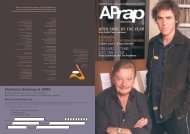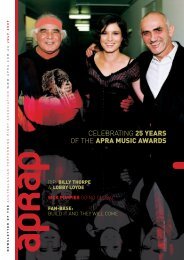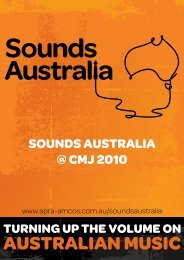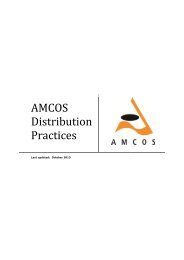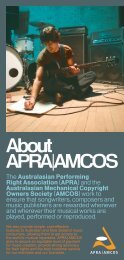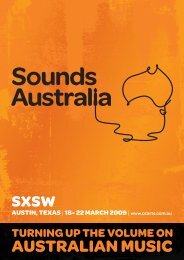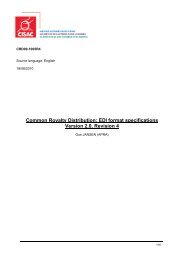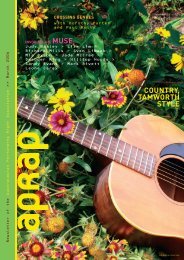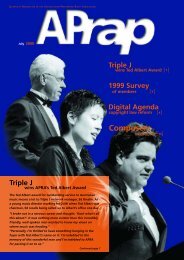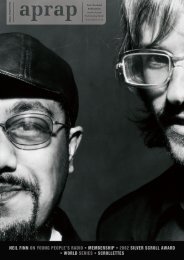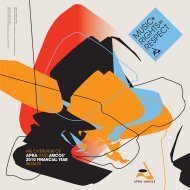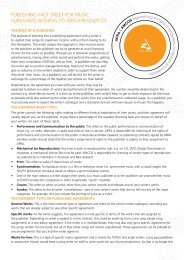CLARE BOWDITCH - APRA
CLARE BOWDITCH - APRA
CLARE BOWDITCH - APRA
You also want an ePaper? Increase the reach of your titles
YUMPU automatically turns print PDFs into web optimized ePapers that Google loves.
By what measure do we assess the overall health or success of<br />
Australian filmmaking? It certainly isn’t the year to year swings<br />
in perceived quality of a year’s production. If taxpayers finance<br />
production primarily for cultural reasons – as distinct from a profit<br />
motive, for which, heaven knows, there are scant prospects – then surely we<br />
should evaluate the films made under that regime on cultural terms. Are they<br />
telling stories that are relevant and compelling, and are they (or some of them)<br />
of lasting value? While Hollywood calibrates its output at the box office – with<br />
a cherry on top at the Oscars - Australian films cannot be judged successful<br />
or otherwise simply by the box office criterion; that is just a measure of their<br />
popularity, not their cultural value.<br />
>> Mick Harvey. Photo by Stephen McKenzie. >> Bryony Marks. Photo by Matthew Saville.<br />
And other than the subjective opinions we all have, what makes up this cultural<br />
value? Does a story have to be about Australia or Australians? Or is it enough<br />
that it is told by Australians, automatically ensuring that it is told from our<br />
unique perspective? I opt for the latter and suggest that the complex mix of<br />
narrative, character, mise en scene and music are the principal elements that<br />
combine to create a unique cultural framework for each film. And while I have<br />
listed music last, in this list all the elements carry equal responsibility and<br />
equal authority.<br />
Rocking the suburbs<br />
with Mick Harvey<br />
“Most musicians fancy the idea<br />
of writing music for a film. You<br />
expect any musician to see that as<br />
something fun or interesting to do.<br />
Whether you are good at it or not<br />
is another issue I suppose,” muses<br />
Mick Harvey.<br />
Arranger, composer and co-founder of<br />
Nick Cave and the Bad Seeds and The<br />
Birthday Party, Harvey found his way to<br />
composing film scores through networks<br />
of arts contacts in Berlin in the 80s.<br />
Released in October, and nominated for 12<br />
AFI Awards including Best Original Screen<br />
Score, Suburban Mayhem marks his second<br />
collaboration with director, Paul Goldman.<br />
“Paul is an old friend and we kind of came<br />
out of the same scene really. He was<br />
studying film in Melbourne when our bands<br />
were starting off and shot a few clips for<br />
us. When he finally wanted someone to do<br />
his score for Australian Rules, he asked me<br />
if I was interested. We had a good working<br />
relationship on the first film, so Suburban<br />
Mayhem just followed on from that.<br />
Suburban Mayhem is a black comedy that<br />
follows the path of destruction and havoc<br />
wrecked by teenage monster, Katrina.<br />
Harvey’s score blisters with loud, dark<br />
rock underscoring the anger and appetite<br />
of a young woman spiralling out of<br />
control. The soundtrack also features<br />
scorching covers of Double Dare and Sex<br />
Beat, produced by Harvey and performed<br />
by Magic Dirt’s Adalita.<br />
Harvey views creating a film score as a<br />
way of adding texture to areas of a film<br />
that need assistance or are crying out<br />
for juxtaposition. “It’s an opportunity to<br />
provide an expansion of the information<br />
through what the music can bring.”<br />
Although he goes on to point out that<br />
the composer doesn’t always control<br />
how their music is finally presented. In<br />
reference to Suburban Mayhem he explains,<br />
“Conceptually I would have liked to have<br />
had more say in the type of source music<br />
(pre-existing songs) being used, to create<br />
an overall musical pattern or aural concept.”<br />
He notes, philosophically, “it just didn’t<br />
work out that way... it’s a tough one.”<br />
Making noise<br />
Newcomer Bryony Marks tracks<br />
her journey to her first feature film.<br />
“I know it’s a cliché but you do this because<br />
you love it; it’s often not very lucrative and<br />
it does take a long time to get anywhere,”<br />
remarks Bryony frankly. Having worked on<br />
over twenty films and numerous chamber<br />
and theatre pieces since 1996, it’s only<br />
been in the past three years that Bryony<br />
has been able to ‘make a living’ from screen<br />
composing.<br />
Commercial success has come in the form<br />
of scoring the first block (three episodes)<br />
of the Network Ten drama The Surgeon, a<br />
collaboration with Chris Lilley on the sixpart<br />
ABC mockumentary, We Can Be Heroes,<br />
plus nominations for Best Television Theme<br />
and Best Original Song Composed for the<br />
Screen (for Indigeridoo) at the 2006 <strong>APRA</strong>-<br />
AGSC Screen Music Awards.<br />
“We Can Be Heroes was my first TV<br />
gig (not including commercials). Chris<br />
wanted the series to present as a genuine<br />
documentary; he didn’t want music that<br />
made it sound like a comedy. He had heard<br />
CDs of my ‘serious’ music, took a bit of a<br />
leap of faith and chose me to do the score.<br />
Chris and I worked really well together,<br />
creating Indigeridoo (he wrote the lyrics, I<br />
wrote the music) was just too much fun – it<br />
all just flowed.”<br />
Bryony has also just completed work on<br />
the score for her first feature film. Noise,<br />
due for release in 2007, is a collaboration<br />
with her film-maker husband, Matthew<br />
Saville.<br />
“Noise was my first orchestral film score.<br />
Having not had the opportunity to write for<br />
a larger ensemble since uni, I was pretty<br />
anxious about this score. I have never<br />
started writing again so many times, but it<br />
feels like it has been worth the effort.”<br />
Bryony describes Noise as a very unusual,<br />
special and intense project. She became<br />
very well acquainted with the script over<br />
the ten years of development by Saville.<br />
“It is unusual to be involved in a film from<br />
so early on, and I certainly felt that I knew<br />
the film intimately by the time I started<br />
writing. Once pre-production commenced<br />
we talked about musical ideas the whole<br />
way through. While the film was being<br />
edited, I wrote sketches on the piano.<br />
Although Matthew and I both liked them,<br />
there was so much work involved in getting<br />
the tone just right that the end result is<br />
unrecognisable.”<br />
Bryony’s passion for her craft and her art<br />
is infectious: “What I find challenging and<br />
fascinating - and why I am interested in<br />
doing film music - is that you get to add a<br />
whole layer, an entire thread to the overall<br />
picture. When you’re lucky enough to<br />
work on a quality production, you get the<br />
opportunity to contribute in a considered<br />
way to the film’s intent, and not just give a<br />
literal response to the action.”<br />
“I read somewhere that every artist paints<br />
the same picture, writes the same story or<br />
the same song over and over again. In a<br />
way, that’s how I feel about my music; it’s<br />
always about working through how I feel<br />
about being in the world.”<br />
Music, which I call the intravenous artform for its visceral ability to create a<br />
specific mood in an instant, is perhaps the most complex of them all - and<br />
perhaps the least appreciated by the public and even some filmmakers. I have<br />
heard many stories from composers around the world about the cavalier<br />
attitude of some directors and producers to the score. That attitude is often<br />
exhibited through the afterthought nature of the budget allocated for original<br />
music. The relative scarcity of film score work in Australia makes this a<br />
particularly challenging aspect of film composing.<br />
The fact that Australian composers have risen to these challenges in a creative<br />
sense is notable. It’s true that the ‘value’ of music to a film is intangible and<br />
incalculable, it is nevertheless enormous – hardly an original proposition.<br />
You’d be like a caterpillar up wolf creek without a machete in half light if your<br />
score didn’t touch the right nerve, considering that film needs both intellect<br />
and emotion to engage us.<br />
For example, Cezary Skubiszewski’s unique and striking score for The Book<br />
of Revelation – with Paul Pirola’s excellent sound design – characterises the<br />
excellence of the creative force at work in Australian film composition - and they<br />
are not alone, as many of this year’s film scores demonstrate. (Skubiszewski’s<br />
score for Ana Kokkinos’ The Book of Revelation won the award for Best Score<br />
at this year’s Film Critics Circle of Australia Awards, and is nominated in the AFI<br />
Awards – presented December 6 & 7.)<br />
As Skubiszewski points out, the Australian psyche seems to respond best to the<br />
sounds of a rock guitar. Americans like big production numbers and the Brits<br />
like pop songs – these are generalisations, to be sure, but useful ones and<br />
Skubiszewski’s diverse range of scores often pay heed to this understanding<br />
of the audience. The rock guitar pops up even in the score for The Book of<br />
Revelation, where he uses the musical colours of a string quartet and three<br />
voices for much of the film, with jazzy backgrounds.<br />
The cue at the start of the film, for example, creates complex visceral expectations<br />
in the viewer, combining an urge to explore, a sense of dread... with a hint of<br />
mystery. This segues into a driving piece of modern dance music for the rehearsal<br />
scene, showing dexterity and great diversity in the composing.<br />
Later, when the mood changes in the final act, the sense of tentative optimism is<br />
echoed in a switch to the colours of woodwinds (two flutes, two clarinets) and<br />
some piano. Subtle yet strong, the music seems perfect for the images.<br />
In my view, the high standard of Australian composing for the screen plays a<br />
significant role in our screen culture and filmmakers who understand this find<br />
their films enhanced and elevated by the music – something that is certainly<br />
one test of a film’s lasting cultural value.<br />
Andrew Urban created and interviews for SBS TV’s popular Front Up series.<br />
He is Channel Host for the World Movies Channel and a presenter for Movies<br />
This Week, Ovation & World Movies Channels. He is also the Editor of<br />
www.urbancinefile.com.au, an award-winning, weekly online movie magazine.<br />
Australian<br />
film &<br />
music:<br />
an Urbane<br />
perspective<br />
By Andrew L. Urban<br />
A P R A P D E C E M B E R 2 0 0 6 > > 1 2



